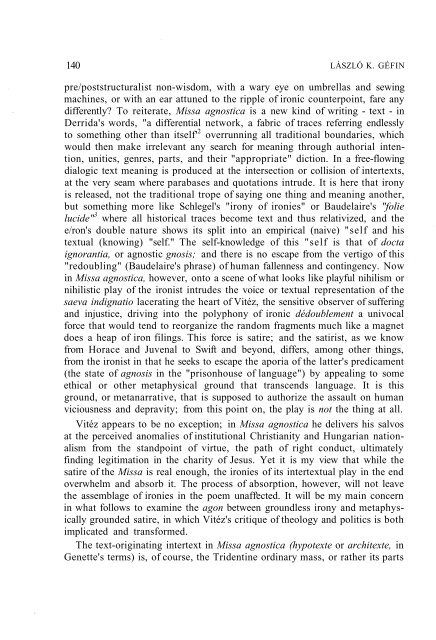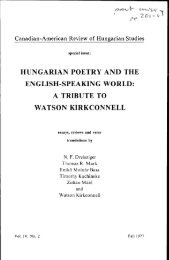140 LÁSZLÓ K. GÉFINpre/poststructuralist non-wisdom, with a wary eye on umbrellas and sewingmachines, or with an ear attuned to the ripple of ironic counterpoint, fare anydifferently? To reiterate, Missa agnostica is a new kind of writing - text - inDerrida's words, "a differential network, a fabric of traces referring endlesslyto something other than itself' 2 overrunning all traditional boundaries, whichwould then make irrelevant any search for meaning through authorial intention,unities, genres, parts, and their "appropriate" diction. In a free-flowingdialogic text meaning is produced at the intersection or collision of intertexts,at the very seam where parabases and quotations intrude. It is here that ironyis released, not the traditional trope of saying one thing and meaning another,but something more like Schlegel's "irony of ironies" or Baudelaire's "folielucide" 3 where all historical traces become text and thus relativized, and thee/ron's double nature shows its split into an empirical (naive) "self and histextual (knowing) "self." The self-knowledge of this "self is that of doctaignorantia, or agnostic gnosis; and there is no escape from the vertigo of this"redoubling" (Baudelaire's phrase) of human fallenness and contingency. <strong>No</strong>win Missa agnostica, however, onto a scene of what looks like playful nihilism ornihilistic play of the ironist intrudes the voice or textual representation of thesaeva indignatio lacerating the heart of Vitéz, the sensitive observer of sufferingand injustice, driving into the polyphony of ironic dédoublement a univocalforce that would tend to reorganize the random fragments much like a magnetdoes a heap of iron filings. This force is satire; and the satirist, as we knowfrom Horace and Juvenal to Swift and beyond, differs, among other things,from the ironist in that he seeks to escape the aporia of the latter's predicament(the state of agnosis in the "prisonhouse of language") by appealing to someethical or other metaphysical ground that transcends language. It is thisground, or metanarrative, that is supposed to authorize the assault on humanviciousness and depravity; from this point on, the play is not the thing at all.Vitéz appears to be no exception; in Missa agnostica he delivers his salvosat the perceived anomalies of institutional Christianity and Hungarian nationalismfrom the standpoint of virtue, the path of right conduct, ultimatelyfinding legitimation in the charity of Jesus. Yet it is my view that while thesatire of the Missa is real enough, the ironies of its intertextual play in the endoverwhelm and absorb it. The process of absorption, however, will not leavethe assemblage of ironies in the poem unaffected. It will be my main concernin what follows to examine the agon between groundless irony and metaphysicallygrounded satire, in which Vitéz's critique of theology and politics is bothimplicated and transformed.The text-originating intertext in Missa agnostica (hypotexte or architexte, inGenette's terms) is, of course, the Tridentine ordinary mass, or rather its parts
THE AGON OF IRONY AND SATIRE 141traditionally set to music by composers (Kyrie, Gloria, Credo, Sanctus, AgnusDei), to which Vitéz has added the Introitus and the Ite missa est. In each parthe quotes the full Latin text, provides a translation, and with the aid of freeassociation, the primary intertext sets off random series of other intertexts aswell as bits of personal reminiscences, allusions to family and world history,on occasion supplemented by such literary devices as sharply focussed images,sonnets, lists, catalogues, and musical forms adapted to poetry. The over-alleffect of heterogeneous textual matter appended to the Latin mass is not unlikethat of Duchamp's moustachioed Mona Lisa. Like "L.H.O.O.Q." Vitéz'sprofane exegesis literally defaces the sacred original by aestheticising it: theLatin mass is treated as just another language game, as a human inventionserving particular social and historical needs, devoid of transcendental appealor authority. This analogy is only partly accurate, for the satirist is not aprankster, or if so, he is a prankster with a purpose. The disfigured mass isstill a kind of mass, as the oxymoronic title indicates. There may also be other,less obvious factors at play. Just as underneath the moustache there remainsan image of Leonardo's masterpiece, the target of Duchamp's ridicule (but alsothat of his envy and desire), so in the commentary of Vitéz's Missa, ostensiblygoverned by the linguistic freeplay of a positive grammatology, there remainsa theodicy, albeit a negative one.This tension would ultimately make the Missa a deconstructive/satiricalre-enactment of the catholic mass by an agnostic who yearns for the certaintyof gnosis. (The assigning of the term "deconstruction" to the Missa as a wholeis made advisedly, using it in its strictest sense as a writing-specific critique ofmetaphysical systems working from within those systems. As Derrida has putit, "The movements of deconstruction do not destroy structures from theoutside. They are not possible and effective, nor can they take accurate aim,except by inhabiting those structures." Remaining on, and working from, theinside, however, has its drawbacks. Derrida is aware of this when he writes,"Operating necessarily from the inside, borrowing all the strategic and economicresources of subversion from the old structure ... the enterprise ofdeconstruction always in a certain way falls prey to its own work" [24].)Because it is both disfigurement and satire, Missa agnostica of necessity"operates from the inside," from within the structures of the mass andChristianity, and of the Hungarian language. As grammatologist, in hisexegesis Vitéz re-reads, de- and re-constructs, disrupts, scrambles, and decentersthe mass through deformation (and defamation) of language, yetlanguage remains for him, as it were, the last refuge: "az ének véd; éltet ajóslat; a betű őrt áll" [the song protects; the prophecy giveth life; the letterstands on guard] (20). Some five years before embarking on Missa agnostica,
- Page 1 and 2:
Papers of the Radnóti Memorial Con
- Page 3:
HUNGARIAN STUDIESVOLUME 11, 1996 CO
- Page 8 and 9:
6 GEORGE GÖMÖRIprobably Fürst an
- Page 10 and 11:
8 GEORGE GÖMÖRIof the utmost impo
- Page 12 and 13:
10 GEORGE GÖMÖRIén e földön...
- Page 14 and 15:
12 GEORGE GÖMÖRINotes1. Miklós R
- Page 16 and 17:
14 MIHÁLY SZEGEDY-MASZÁKself alwa
- Page 18 and 19:
16 MIHÁLY SZEGEDY-MASZÁKtype is r
- Page 20 and 21:
18 MIHÁLY SZEGEDY-MASZÁKpose, the
- Page 22 and 23:
20 MIHÁLY SZEGEDY-MASZÁK"Wozu Dic
- Page 24 and 25:
22 MIHÁLY SZEGEDY-MASZÁKand Wilme
- Page 26 and 27:
24 MIHÁLY SZEGEDY-MASZÁKbeen the
- Page 28 and 29:
26 MIHÁLY SZEGEDY-MASZÁKBolond, k
- Page 30 and 31:
28 MIHÁLY SZEGEDY-MASZÁK6. Emery
- Page 32 and 33:
30 ZSUZSANNA OZSVÁTHand breaks as
- Page 34 and 35:
32 ZSUZSANNA OZSVÁTHThe drama echo
- Page 36:
34 ZSUZSANNA OZSVÁTHcontinents at
- Page 39 and 40:
FROM CAIN TO NAHUM 37which, as Csap
- Page 41 and 42:
\FROM CAIN TO NAHUM 39and bears and
- Page 43 and 44:
FROM CAIN TO NAHUM 41who sees what
- Page 45 and 46:
FROM CAIN TO NAHUM 438. "A félelme
- Page 47 and 48:
HELP ME, PASTORAL MUSE:THE VIRGELIA
- Page 49 and 50:
HELP ME, PASTORAL MUSE 47compete! W
- Page 51 and 52:
HELP ME, PASTORAL MUSE 49of a priva
- Page 53 and 54:
HELP ME, PASTORAL MUSE 51Once again
- Page 55 and 56:
HELP ME, PASTORAL MUSE 53Eighth Ecl
- Page 57 and 58:
HELP ME, PASTORAL MUSE 55have that
- Page 59:
HELP ME, PASTORAL MUSE 57Paul de Ma
- Page 62 and 63:
60 SAMUEL J. WILSONWe did, however,
- Page 64 and 65:
62 SAMUEL J. WILSONbeings and contr
- Page 66 and 67:
64 SAMUEL J. WILSONHungarians would
- Page 68 and 69:
66 SAMUEL J. WILSONthe Austrians. G
- Page 70 and 71:
68 SAMUEL J. WILSONnorth-eastern Zi
- Page 72 and 73:
70 SAMUEL J. WILSONoriginally pursu
- Page 74 and 75:
72 SAMUEL J. WILSONGörgey's decisi
- Page 76 and 77:
74 SAMUEL J. WILSONfrom occurring,
- Page 78 and 79:
76 SAMUEL J. WILSON8. Artúr Görge
- Page 80 and 81:
78 STEVEN TÖTÖSY de ZEPETNEKtört
- Page 82 and 83:
80 STEVEN TÖTÖSY de ZEPETNEKThe c
- Page 84 and 85:
82 STEVEN TÖTÖSY de ZEPETNEKher u
- Page 86 and 87:
84 STEVEN TÖTÖSY de ZEPETNEKthe b
- Page 88 and 89:
86 STEVEN TÖTÖSY de ZEPETNEKrooti
- Page 90 and 91:
88 STEVEN TÖTÖSY de ZEPETNEKcriti
- Page 92 and 93: 90 STEVEN TÖTÖSY de ZEPETNEK'My f
- Page 94 and 95: 92 STEVEN TÖTÖSY de ZEPETNEKshe d
- Page 96 and 97: 94 STEVEN TÖTÖSY de ZEPETNEKNotes
- Page 99 and 100: BERLIN ET PARIS DE LAJOS TIHANYIVAL
- Page 101 and 102: BERLIN ET PARIS DE LAJOS TIHANYI 99
- Page 103 and 104: BERLIN ET PARIS DE LAJOS TIHANYI 10
- Page 105 and 106: BERLIN ET PARIS DE LAJOS TIHANYI 10
- Page 107 and 108: BERLIN ET PARIS DE LAJOS TIHANYI 10
- Page 109 and 110: BERLIN ET PARIS DE LAJOS TIHANYI 10
- Page 111 and 112: BERLIN ET PARIS DE LAJOS TIHANYI 10
- Page 113 and 114: BERLIN ET PARIS DE LAJOS TIHANYI 11
- Page 115: BERLIN ET PARIS DE LAJOS TIHANYI 11
- Page 118 and 119: 116 KEVIN E. KELLYfilms Lugosi made
- Page 120 and 121: 118 KEVIN E. KELLYthe provinces, no
- Page 122 and 123: 120 KEVIN E. KELLYWith his brief an
- Page 124 and 125: 122 KEVIN E. KELLYboth his and Dean
- Page 126 and 127: 124 KEVIN E. KELLYfollowed it into
- Page 128 and 129: 126 KEVIN E. KELLYvampiric nobleman
- Page 130 and 131: 128 KEVIN E. KELLYThe film also boo
- Page 132 and 133: 130 KEVIN E. KELLYWood remained one
- Page 134 and 135: 132 KEVIN E. KELLYLugosi, convinced
- Page 136 and 137: 134 KEVIN E. KELLY19. Lennig, 112-1
- Page 139 and 140: THE AGON OF IRONY AND SATIREIN GYÖ
- Page 141: THE AGON OF IRONY AND SATIRE 139poe
- Page 145 and 146: THE AGON OF IRONY AND SATIRE 143fek
- Page 147 and 148: THE AGON OF IRONY AND SATIRE 145ner
- Page 149 and 150: THE AGON OF IRONY AND SATIRE 147whi
- Page 151 and 152: THE AGON OF IRONY AND SATIRE 149mov
- Page 153 and 154: THE AGON OF IRONY AND SATIRE 151for
- Page 155 and 156: THE AGON OF IRONY AND SATIREA harma
- Page 157 and 158: MURDER IN THE MOUNTAINSTranslated b
- Page 159 and 160: MURDER IN THE MOUNTAINS 157"Afraid?
- Page 161 and 162: MURDER IN THE MOUNTAINS 159Abády,
- Page 163 and 164: MURDER IN THE MOUNTAINS 161"The mar
- Page 165 and 166: MURDER IN THE MOUNTAINS 163Bálint
- Page 167 and 168: MURDER IN THE MOUNTAINS 165"That is
- Page 169 and 170: MURDER IN THE MOUNTAINS 167at hand,
- Page 171 and 172: CONTRIBUTORSMiklós BÁNFFYLászló
















